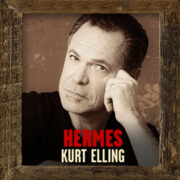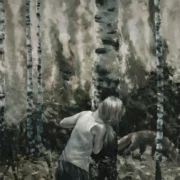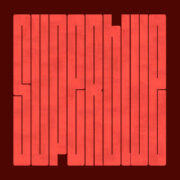No conversation with Kurt Elling could ever go in a single direction. The progressive baritone vocalist, with a predilection for post-bop vocalese, soulful scat, mad drama, holy tongue-speaking and Beat theocracy, has a million stories to spin, with each of those cool million holding their own heart-filled set of vein-like tributaries.
Now, in the summer of content 2025, he’s opened the spigot to big band jazz, remade his funky-chic SuperBlue pairing with guitarist Charlie Hunter into a weirdly, ferocious rock-focused wedding band; and become a new label and management magnate with Big Shoulders Records.
As if that’s not enough: Come September 2, the vocalist will take to the Broadway stage for the heralded role of Hermes — the show-stopping narrator Greek god role that won Andre De Shields a Tony Award — in the hit show Hadestown, at the Walter Kerr Theatre on Broadway.
In the immortal words of “Doc” from West Side Story, Kurt Elling is busting like a hot water pipe.

Before the hot season hits, SuperBlue will have released Guilty Pleasures Vol. 2, featuring fractured takes on ZZ Top, Fleetwood Mac and Electric Light Orchestra. That’s on Big Shoulders, which also released Elling’s dark windy cover of “Steppin’ Out” by Joe Jackson, the single precursor to his expansive In the Brass Palace featuring the WDR Big Band (due out in 2026). Also due out is the next in Elling’s Wildflowers “impromptu duo” EP series, a set with pianist Christian Sands recorded just last week.
“We can drop releases when we want them dropped, and in the manner that we wish to drop them with the art that we want, and the people we wish to partner with,” says Elling of Big Shoulders.
Living Questions
It is just this sort of flexibility that defines the present-future model of Kurt Elling, as opposed to the guy who started in 1995. It’s 30 years since his debut album Close Your Eyes, on Blue Note yet, with its uneasy listening, Mark Murphy-on-molly vibe (he laughs at that description).
“I was pretty naïve then, almost certainly underqualified to be on Blue Note, and had little to no road experience,” says Elling of his 1995 self. “I was putting all of my pieces together. To my credit, I was ambitious about the right things — the conceptual standards set by Murphy, Jon Hendricks, Joe Williams and Andy Bey, the play of possibilities that were on the menu, taking advantage of the doors that they opened sonically.”
By doing spoken-word and vocalese “things,” tackling surprise improvisational elements and singing difficult material with equally rigorous lyrics — of course respecting his band and longtime arranger-pianist Laurence Hobgood — Elling and his close collaborators never need worry about reining in their wildest creative instincts. “What I hear now in that record is someone whose reach extended their grasp, but I’m proud of having the bravery … or naïvete. No one told me that I couldn’t do those things, so I just put it all out there.”

Elling had another life prior to jazz, as a grad student at University of Chicago Divinity School, going for a master’s in philosophy of religion and a gig with the Council of Churches. His father was a church musician. No one walks away from such religiosity without lasting effects. So?
“Jazz is uniquely suited to living questions: What melody will come tonight? Can I do something that I and everyone else has never heard before? Maybe my bandmates and I can spur each other on to something unimaginable? I feel as if those questions hold direct correlation to the most honest experience of being. Humility, gratitude and the use of one’s gifts to help people to sustain hope and wonder, of their own inquiry — that’s what a jazz singer can bring into the world … striving to make the most beautiful music for the highest possible good for the listener.”
God, then, is in the details — all the details — of what Kurt Elling, the conduit, does. “I’m living my vocation,” he says. “The kicks and rewards I get come from outdoing what I did before, and from being the embodiment of what I believe in.”

What Elling believes in, when it comes to SuperBlue, is the longtime friendship of his acidic-jazzy pal Hunter, signed to Blue Note nearly the same time as the vocalist. “Getting stuff done with Charlie” has long been a priority for Elling. “We’re road dogs, and we share that survivalist energy. You need that if you’re going to stand on stages for 30-plus years.”
What finally made SuperBlue a reality was Covid, as Elling planned a nearly two-year tour with Danilo Pérez that never happened. “We were going to do the deep-dive mindprobe when the tour was scrapped,” Elling recalls. “That’s when Charlie came to me and said we should record together, finally … and do it the 21st-century way. He sent me rhythm tracks, 15 different grooves, chord changes and musical notions. I don’t have his computer skills, so I can’t edit and there was no melody here. Charlie said that was my job: make melody. Go to it. Now that was truly a salvific moment.”
The backbeat-heavy SuperBlue of 2021 was born into that funky breach, with the duo’s equally soulful The Iridescent Spree and Guilty Pleasures Vol. 1 (with guest drummer Nate Smith) as its follow-ups. As for the idea of covering Johnny “Guitar” Watson, Steve Miller and Fleetwood Mac on Vol. 2, Elling says if the joy is overflowing and the laughs are genuine, keep going.
“You got to let the horses run,” he says about his continued work with Hunter this year. “One of the reasons you fall in love with a friend is because you love their sense of humor.” And what could be funnier than hearing Elling and Hunter rip the roof off of ZZ Top’s “Sharp Dressed Man” and Steve Miller’s “Gangster of Love.”
Opening Up the Pumps
Joy is “the thing” on the aptly titled Guilty Pleasures series and its look at the FM sounds of the duo’s collective youth. “It’s serious music, but we ain’t taking it seriously at all,” states Elling. “Whenever I read back my interviews, and the comments that I’ve made, I’m always thinking about how insufferable I sound, how I take everything so serious. Joy comes in so many flavors. Just throw it out there. Getting beyond yourself is essential when it comes to Guilty Pleasures.”
One genuinely beguiling aspect of Elling’s voice throughout the Guilty Pleasures experience is that his usual super-elastic fluidity comes with calluses, tougher around its edges. Would this be down to executing roughhoused songs such as “Desperado” and “Gangster of Love,” or is Elling acting the part?
“I’m fortunate that my voice still wants to do it and continues to have a flexibility of sound,” he says. “It does what I ask it to. And if Charlie and the band are putting stank on the tracks, I got to bring the stankiest vibe possible. I’m there to embody this stuff, even if it is with a self-knowing smile.”
If we’re on the topic of cover versions, this vocalist has been down the road of Joe Jackson’s cosmopolitan pop moment “Steppin’ Out” previously — on his 2011 album The Gate — before big-banding it for this summer 2025 single. While Jackson’s softly snaking track reminds this writer of the allure of driving through Manhattan at night (“me too,” says Elling), it was the bold, sinewy new arrangement by Michael Abene that sold the singer.
“When I first did “Steppin’ Out,” the WDR and I were already working together, and had paid Abene for this magnificent arrangement and several others. I had to sit on them for a time, as I didn’t have an opportunity to do them with a big band. I didn’t need to commission anything new. It was a matter of, ‘Dude, we need to get these charts out.’”
Abene’s driving, hyper-Gil-Evans-esque arrangements and Elling’s subtle vocal trills for “Steppin’ Out” are a gentle precursor to In the Brass Palace, featuring the WDR Big Band. “To sing in front of a big band, or to embody a big band singer, it’s a real stylistic challenge that requires great energy. If you’re doing it well, it is you that is swinging the band, not the other way around.”
In the Brass Palace is a promised first volume of dashing, sword-dueling widescreen jazz with Cologne’s Westdeutscher Rundfunk (WDR) crew, and it’s not Elling’s first time with the big band experience. The vocalist says he had the “ultimate thrill” of working with Jeff Hamilton and John Clayton and their orchestra, and “going full-bore big band, opening up all the pumps.” “Those charts steamrolled,” he exclaims. “On the WDR stuff, it’s just a little bit more of me embodying the import, the message, the melody and the atmosphere of all the moving parts of a big band. And that it all sounds coherent, solid-state.”
Going into Business
Elling’s former longtime soundman and road manager Bryan Farina is now the vocalist’s manager, and his partner in Big Shoulders Records. Farina also heads Big Shoulders Artist Services, which offers artist-first support in management, marketing and career development.
“I will never be able to thank Bruce Lundvall enough for plucking me from obscurity, believing in me and supporting just about every decision I threw in front of him,” says Elling of the “great music guy” heading up Blue Note at the time of his signing. “The boost I got from Blue Note for those albums is immeasurable. At the same time, it’d be nice to own my masters. … It’s not an equal partnership.”
Farina knows what the singer has been through and where he wishes to go professionally. At 57 this is crucial for Elling: having a greater stake in his own present and future. “Bryan saw that I was running out of gas,” Elling says. “Happy to be on the road, but not sure what my next move was, what album I should do next, what rooms we should be playing. I was getting tired of strategizing. … So I focus on the singing and writing the lyrics. The only thing that I came up with was the label name.”
In Elling’s mind, Farina has come across with all the ambition that was flagging within the singer — everything from finally being able to afford the WDR album release, to the spur-of-the-moment Wildflower releases with Elling at his most improvisational alongside Sullivan Fortner, Cécile McLorin Salvant, Joey Calderazzo and Ingrid Jensen.
When it comes to additional job descriptions beyond Elling’s usual, the Hadestown news stands out even more than new label owner. Comparing the shock of being called upon to portray Hermes to getting the gig singing with Branford Marsalis on his 2016 Upward Spiral album (“You’re talking to me?” Elling says, imitating his response to the saxophonist’s phone call), Elling swears that he will give 110 percent to the gods of Broadway. “I will not go halfway on this; not that I ever do, but, c’mon, it’s Hadestown.”
Keeping His Day Job
Currently, Elling is looking at two additional Wildflowers digital EPs, including the soon-released duet with pianist Christian Sands; his long-gestating Weather Report project, and a next offering of WDR charts after the 2026 release of In the Brass Palace. “First things first, you know,” says Elling. “There are a few first-time surprises in the works, too” (something we can’t say on the record for another month, so look for it).
Once the handlebars are firmly on the bike that is Big Shoulders, Elling’s next goal for the label is helping other artists to release their music, own their own masters and “do their own thing, have a righteous exchange between artist and label. Bryan is busting his ass to make this happen the right way, for artists to expand their creative and business possibilities.”
Farina may take on the daily yeoman’s work of Big Shoulders Records and its Artist Services affiliate, but Elling is the brand name at the top, the good housekeeping seal of approval. At 57, does Elling feel that mentorship, brotherhood and helping fellow jazz artists, veteran and newbie, is where he sees the second half of his life going?
“I have a day job,” says the singer with a big laugh. “Whatever act that I am on — second, third, fourth — my goal is to put out as much beautiful music as I can, explore all that I want to explore as a singer, like this Weather Report catalog.” [He’s touring this summer with Yellowjackets, doing Weather Report songs.]
“The life I’ve been able to live within this music is preposterously unlikely. For some dorky, pimple-faced, glasses-wearing kid from Rockford, Illinois to be invited into the tent, to get encouraged from the very start before I had any business, and for that translating so swiftly into things like Jon Hendricks calling me ‘son,’ to performing Joni Mitchell compositions with Wayne Shorter and Herbie Hancock at the Hollywood Bowl, to working with Charlie Hunter and the WDR cats — all of this is beyond mere logic. My goal is the same now as it was when I made Close Your Eyes, to sing the best stuff that I can in the most organically signature way that I can because the lyrics have to rhyme where the music rhymes.” JT
